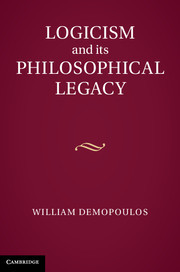Description
Logicism and its Philosophical Legacy
Author: Demopoulos William
These essays apply the core conceptual innovation underlying Frege's theory of number to the general analysis of theoretical knowledge.
Language: English
Subject for Logicism and its Philosophical Legacy:
Approximative price 73.89 €
In Print (Delivery period: 14 days).
Add to cart
Logicism and its Philosophical Legacy
Publication date: 01-2013
281 p. · 15.8x23.5 cm · Hardback
Publication date: 01-2013
281 p. · 15.8x23.5 cm · Hardback
Approximative price 30.28 €
In Print (Delivery period: 14 days).
Add to cart
Logicism and its Philosophical Legacy
Publication date: 03-2015
Support: Print on demand
Publication date: 03-2015
Support: Print on demand
Description
/li>Contents
/li>Biography
/li>
The idea that mathematics is reducible to logic has a long history, but it was Frege who gave logicism an articulation and defense that transformed it into a distinctive philosophical thesis with a profound influence on the development of philosophy in the twentieth century. This volume of classic, revised and newly written essays by William Demopoulos examines logicism's principal legacy for philosophy: its elaboration of notions of analysis and reconstruction. The essays reflect on the deployment of these ideas by the principal figures in the history of the subject - Frege, Russell, Ramsey and Carnap - and in doing so illuminate current concerns about the nature of mathematical and theoretical knowledge. Issues addressed include the nature of arithmetical knowledge in the light of Frege's theorem; the status of realism about the theoretical entities of physics; and the proper interpretation of empirical theories that postulate abstract structural constraints.
Preface; Introduction; 1. Frege's analysis of arithmetical knowledge; 2. Carnap's thesis, on extending 'empiricism, semantics and ontology' to the realism-instrumentalism controversy; 3. Carnap's analysis of realism; 4. Bertrand Russell's The Analysis of Matter: its historical context and contemporary interest with Michael Friedman; 5. On the rational reconstruction of our theoretical knowledge; 6. Three views of theoretical knowledge; 7. Frege and the rigorization of analysis; 8. The philosophical basis of our knowledge of number; 9. The 1910 Principia's theory of functions and classes; 10. Ramsey's extensional propositional functions.
William Demopoulos is Professor of Philosophy at the University of Western Ontario. He has edited many volumes on foundational and philosophical issues arising in the sciences, including Physical Theory and its Interpretation (with Itamar Pitowsky, 2006) and Frege's Philosophy of Mathematics (1995).
© 2024 LAVOISIER S.A.S.

